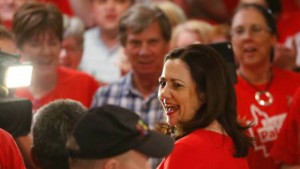Home » Commentary » Opinion » Australia’s conservatives post-Queensland: the only hope is hope
· THE SYDNEY MORNING HERALD

 Can the crisis of Australian conservatism get any worse? If Annastacia Palaszczuk’s Queensland government is returned – and, at this stage, Labor is the favourite to win a majority – LNP rumblings will grow louder. And if the Liberals cop a massive 10 per cent swing to lose the December 16 federal byelection for the seat of Bennelong – which polls show is conceivable – the venom will fracture the Liberal movement, perhaps fatally.
Can the crisis of Australian conservatism get any worse? If Annastacia Palaszczuk’s Queensland government is returned – and, at this stage, Labor is the favourite to win a majority – LNP rumblings will grow louder. And if the Liberals cop a massive 10 per cent swing to lose the December 16 federal byelection for the seat of Bennelong – which polls show is conceivable – the venom will fracture the Liberal movement, perhaps fatally.
Malcolm Turnbull would need a miracle to win the next election, and you might think we’re reliving history.
Go back to early 2001: Peter Beattie’s Labor government was re-elected. Pauline Hanson’s One Nation split the Coalition vote. A few weeks later the Liberals lost unexpectedly the safe federal seat of Ryan with a savage 10 per cent swing. The then-Liberal prime minister, John Howard, was written off as yesterday’s man. On February 19, after Labor’s Queensland election victory, The Australian‘s front page splashed: “Howard needs a miracle.”
Some say his miracle came with the Tampa asylum-seeker standoff and the September 11 terrorist attacks six months later. Others, including Howard himself, argue he had clawed back Labor’s lead by the winter when the Liberals won the Aston byelection. In any case, Howard went on to beat Kim Beazley before becoming our nation’s second-longest serving leader.
But analogies are tricky; and what will distinguish 2017 from 2001 is the PM’s fate. For Turnbull has at least two things going against him. He is no Howard, the greatest comeback fighter in living memory. And he is Prime Minister at a time when conservatism, at home and abroad, is facing even more severe intramural disputes than it did 18 years ago.
Start with the Howard factor. Desperate politicians will canvass drastic solutions. For Howard in 2001 it was his reverse gear and U-turn, which were up to best international standards. After delivering four years of sound economic management, he threw a lot of tax dollars at the bush. With little in the bank, that’s a luxury Turnbull cannot afford.
Unlike Howard, Turnbull is no political warrior. No doubt he believes he’s made no mistakes and that his troubles stem from the citizenship crisis, Queensland LNP’s campaign and, of course, Tony Abbott, who dances around Turnbull’s leadership like Banquo’s ghost. But as Napoleon noted: “He who says he has made war without making mistakes has made but little war.”
But Turnbull’s problems are also part of a much broader long-term weakening of political allegiances and fragmentation of politics. Fewer people these days, as Queensland reminded us at the weekend, feel tied into firm support for the major parties. More sharply, they also reflect a global crisis of democracy.
The political polarisation and policy dysfunction – from Washington to Westminster to Berlin to Canberra – means an angry public debate and increasingly volatile electorates. From the uncertainties of Brexit and the German Bundesrat to tensions between urban elites and the rest, from anxiety about globalisation to fretting about technological change, there is much to shout about.
Throw in weak political leaders – Turnbull, Theresa May, Angela Merkel, Emmanuel Macron have lower approval ratings than even Donald Trump – and it is plain: western democracy is in bad shape.
Put this all together and you have an Australian prime minister who is like the losing coach at the end of the footy season: he lingers on, but he has reached the point where even victories can’t save him. The evidence is everywhere in the political system: in the polls; in the cabinet leaks; the splintering of the conservative movement; in the fatalistic mood of most Coalition MPs; and now in Queensland Labor’s likely return to power.
All eyes now turn to Sydney’s north-west. In three weeks, we will find out whether Bennelong looks not so much like Turnbull’s Ryan (the aforementioned safe seat the Howard government lost in 2001) but his Bass. That’s the Tasmanian seat the Whitlam government lost unexpectedly in June 1975 with a massive swing repeated in the landslide that brought Malcolm Fraser to power six months later.
As for defenestrating Turnbull, bear in mind The Spectator editor Fraser Nelson’s recent observation about the British Tories’ predicament: they know their Prime Minister “can’t go on, but she can’t be replaced either. And that their only hope is to hope, pray and wait for a solution to present itself – because, as things stand, none is in sight.” These are dark days for conservatism.
Tom Switzer is incoming executive director of the Centre for Independent Studies and presenter at the ABC’s Radio National.
Australia’s conservatives post-Queensland: the only hope is hope